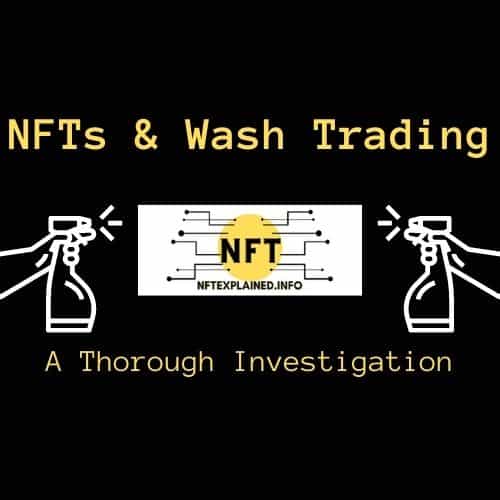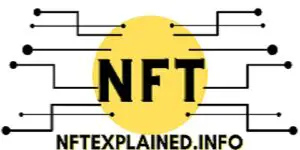
NFTs or non-fungible tokens are blockchain backed, digital assets that allow someone to prove they own a digital item.
NFTexplained.info is a team of long term crypto investors who are well versed in the space and have blockchain experience. In this article we will investigate NFTs and their relation to wash trading; we will include an illustrative example, and much more.
Let’s jump in! What is wash trading?
Wash trades occur when the same individual/company is at the end of both sides of a transaction. To an outside viewer, especially one who hasn’t done their due diligence, this will look like an authentic transaction or a project that is enjoying substantial sales success.
This type of market manipulation involves making a transaction appear authentic when in actuality the transaction is from the same person. A transaction is deemed a wash trade if the goal is to trick the market into thinking something is more desirable via artificial activity.
In the NFT space, a wash trade occurs when an entity or person buys an NFT but is on both sides of the transaction.
NFTexplained.info will now provide an illustrative example of wash trading occurring in the NFT space.
Melania Trump has been accused of wash trading in an NFT auction as the sale of her NFT was purchased by an account that had received funds from the account that listed the NFT for sale.

Due to the blockchain or the vast majority of blockchains like Solana being on a public ledger, people were able to see that the transaction occurred using funds received by an account which listed the NFT.
Since the blockchain is transparent, conducting this type of illegal activity can more easily be traced.
Our team has also thoroughly covered additional topics related to manipulative or illegal activity in NFT marketplaces such as NFTs relation to pyramid schemes as well as money laundering.
Does The NFT Market Involve Wash Trading?
As a general statement, NFTs don’t frequently involve wash trading; it’s likely that only a small percentage of the NFT market involves this fraudulent activity. Since NFTs are on the blockchain, a permanent immutable record is created (it can be viewed by the public, including law enforcement).
There are multiple reasons as to why people are disincentivized to complete wash trades in the NFT space. These reasons include the creation of a permanent record of transactions, identity verification, and simply because it can be unprofitable due to gas fees.
The permanent nature of the blockchain makes it possible to assess when wash trading occurs, especially over a longer period of time, as every transaction can be monitored. This makes it possible to draw conclusions about accounts created by the same entity or person. If the buyer receives funds from the seller, this transaction will forever be stored on the blockchain for all to see.
Aside from the permanent and immutable nature of the blockchain, the process of buying an NFT typically involves some form of identity verification, especially for NFTs of great value.
The first step in purchasing an NFT is to create a digital wallet like MetaMask; MetaMask must be connected to an NFT marketplace like OpenSea for the purchasing of an NFT to occur. For the purchase to occur, cryptocurrency is needed.
Cryptocurrency can be obtained in one of two ways. The first way is through sending crypto bought from crypto exchanges like Binance and Coinbase – which obligate customers to complete Know Your Customer (KYC) identity verification processes – to your MetaMask wallet address. The second way is by purchasing crypto directly via a digital wallet like MetaMask which would require connecting your credit or debit card, again resulting in a form of identity verification.
Wyre and Transak are the two ways in which ETH can be purchased from MetaMask using a debit/credit card. Non-banked backed debit cards (e.g. Vanilla Visa) are not supported by Wyre; Transak requires KYC for the purchasing of crypto. Acquire ETH in these ways requires KYC in some form as does purchasing ETH from a cryptocurrency exchange.
While there is no identity verification to join NFT marketplaces, purchasing an NFT requires crypto and buying crypto often results in some form of identity verification.
In addition to those hurdles in creating wash trades, the Financial Crimes Enforcement Network analyzes information about financial transactions and is one of the multiple bodies that regulate cryptocurrencies in the US.
Another important aspect to consider is that wash trading can be unprofitable. Since it takes gas to verify a transaction, an expense occurs. If there is a lot of demand for transacting on blockchains – like Ethereum – prices can go up to thousands of dollars (gas prices range from close to nothing to as much as over US $100,000).
If you are interested in learning about why transactions can be so costly, our team explains more about that and the consensus algorithms used by different blockchains in the article linked here.
NFTexplained.info will next cover if wash trading is illegal in the NFT space and we will conclude our article by examining if NFTs can be traded.
Is Wash Trading NFTs Legal?
Our team has mentioned that NFTs are susceptible to people utilizing them in a morally corrupt way – as with any new technology – especially one growing at an astounding rate. New users are often joining the NFT space and buying into projects before they fully understand the space.
We will break down the legality of wash trading in the crypto/NFT marketplace as well as in the securities market.
Within the securities market, wash trading is illegal; however, there are currently no regulations governing NFTs and cryptocurrencies. That being said, the House Committee on Ways and Means (the chief tax-writing committee for the US House of Representatives) have discussed applying the wash rule to NFTs and cryptocurrencies.
The IRS has a wash-sale rule which applies to the securities market (e.g. stocks and bonds). In the wash-sale rule, taxpayers are unable to take a tax deduction on a security sold in a wash sale. The wash-sale rule states that, “if an investment is sold at a loss and then repurchased within 30 days, the initial loss cannot be claimed for tax purposes.”
Since crypto and NFTs are not subject to this rule, it is currently possible for digital asset holders to artificially reduce their tax bill. For example, a purchaser of Ethereum could buy ETH at 2,700 and sell for 2,300 a few days later and be able to claim the capital loss of 400 even if ETH is repurchased at 2,300 within 30 days.
This gray area is likely to change as the House Committee on Ways and Means discussed subjecting digital assets to the wash sale rule in a report published on September 13, 2021.
Sec. 138153 Wash Sales states, “This section includes commodities, currencies, and digital assets in the wash sale rule, an anti-abuse rule previously applicable to stock and other securities. The wash sale rule in section 1091 prevents taxpayers from claiming tax losses while retaining an interest in the loss asset. The amendments made by this section apply to taxable years beginning after December 31, 2021.”
More on that can be found here.
Now that we have explained the murky tax benefits that could potentially arise from wash-sales, NFTexplaiend.info will go back to covering the more commonly referred to wash trade. The wash trade in which artificial demand is created by someone on both sides of a transaction.
The good thing about the blockchain is that it is immutable (meaning transactions can’t be tampered with) and it’s public for everyone to see. There are blockchain explorers like Etherscan that can show all transactions from a specific wallet address. In this illustrative example we will discuss Ethereum however there are blockchain based explorers for other blockchains.
By looking to see if the wallet address has received ETH from the account selling the NFT, it is possible to identify wash trades.
These are often signs of a rug pull; if you would like to learn more about rug pulls, including all the red flags to look out for, click here.
Before looking to purchase an NFT, there could be red flags that pop up before the thought of checking blockchain explorers occurs. These red flags may be a fishy website – one that is unprofessional – including spelling errors or even an abnormally high following on social media in a short amount of time.
NFTexplained.info will now conclude our article by explaining if NFTs can be traded.
Can NFTs Be Traded?
There are NFT platforms that allow for the trading of NFTs and NFT collectibles are likely to be traded a lot. An NFT can’t be replaced by another NFT because they are non-fungible. An example of a fungible item is a USD as it can be exchanged for another USD.
NFTs can not be easily or readily exchanged in the same way BTC or ETH can. This is due to the liquidity of NFTs and how the market works. NFTexplained.info has a complete breakdown of how the NFT market operates, which can be found here.
Fungible items can be exchanged amongst one another as they are the same. For example, one ounce of gold is fungible for another single ounce of gold as they hold the exact same purpose and value.
NFTs are non fungible meaning that they are unlike another NFT. Even NFTs in a collection that may visually appear identical are different because of the non-interchangeable metadata that each NFT possesses.
Another factor that can contribute to a higher price in purchasing an NFT is provenance or the notion that the blockchain knows each person who has previously owned that item. If you would like to learn more about provenance in the NFT space, click here.
A real world example of provenance is the Delorean car from the Back to the Future; the car was sold for much more than visually identical Deloreans because it was used in the movie.
If you are interested in learning more about the differences between fungible and non-fungible items, we have a guide in our article which will make you an NFT expert; that article is linked here.
We hope you continue to stay informed at NFTexplained.info. To get the latest news in this rapidly evolving space, follow our team on Instagram & Twitter!
